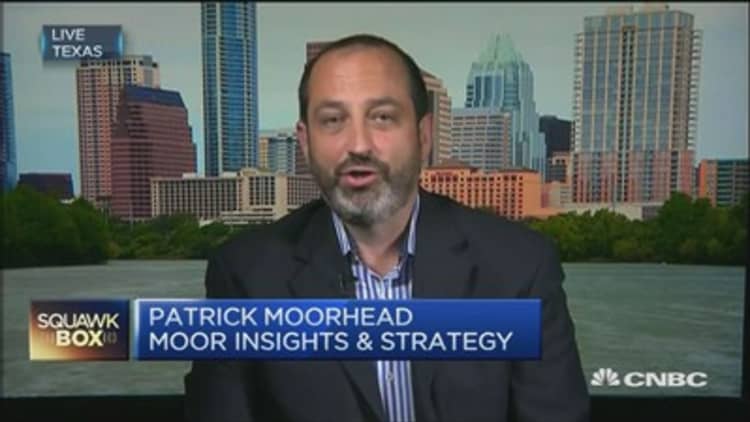
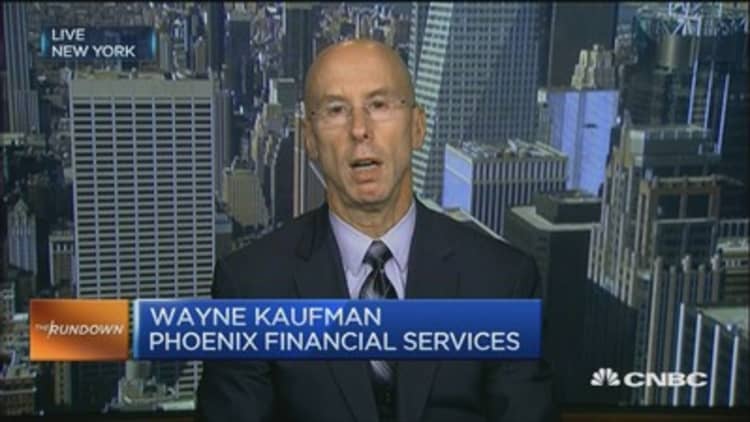
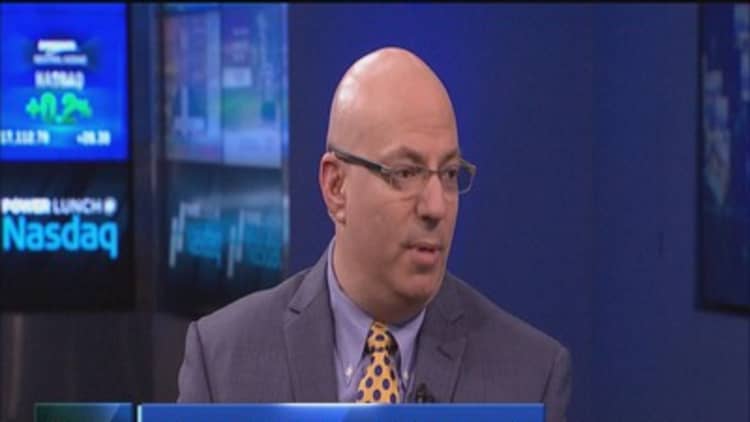
Dell is making a play at being one of the largest enterprise technology firms, thanks to an agreement announced Monday to acquire EMC for $67 billion in cash and stock, in one of the largest-ever technology mergers.
Cost-savings and cross-selling between Dell's small enterprise customers and EMC's large enterprises, sets Dell up to move away from its flagging consumer PC business, creating potential for a "powerhouse of an enterprise company," CEO Michael Dell promised Monday on CNBC's "Squawk Box," Shares of data-storage company EMC inched up more than 1 percent mid-day Monday, on a day financial markets were up less than 0.25 percent.
But the gargantuan merger, which includes investment firm Silver Lake, also sparked debate among skeptical industry watchers, who pointed to multiple roadblocks for the deal's success.
Technology publication Wired dubbed Dell and EMC among the "walking dead" of tech companies, while Fortune magazine compared the companies to two bricks trying to float.
"It's pretty clear that industry is in some kind of inflection point," said Aija Leiponen, professor of innovation strategy at Cornell. "The PC wave that all these old companies rode is coming to the end. It's been hard to be a public PC company. It's interesting to see how different companies are inventing their way out of that."
Dell's strategy to create a one-stop shop for enterprise falls in line behind companies like IBM, that have aggressively favored services over software for years. Microsoft, on the other hand, has focused on consumer-facing hardware.
Even Michael Dell himself acknowledged that there is pressure on the legacy environments to enter the "new age."
"Technology has always been about how do you make old processes more efficient," Dell said on "Squawk Box." "But with all the progress in digital technology, there is a digital transformation that's occurring."
While services are a way to go for the industry, no one is yet sure which strategy will succeed, Leiponen said, though Dell's mix of hardware and software might not "have the right ingredients." Below are some of the challenges to Dell's EMC plan, according to industry watchers.
1. Debt
The merger means the two companies will take on more than $45 billion in additional debt, according to CNBC's David Faber. That's led some to wonder whether Dell will be overly exposed to interest rates, which are slated to be raised by the Federal Reserve over the next year, said IDC analyst Crawford Del Prete.
"Every merger is fraught with difficulties of integrating two different companies' cultures, and creating incentives for key people to stay in there. It will give [Dell] a shorter runway in making it work if interest rates do go up," Leiponen said.
EMC, a public company, has over $5 billion in long-term debt and over $2 billion in short-term commercial paper outstanding, according to their June 30 second-quarter earnings statement. Dell's finances are released confidentially to shareholders.
The joined companies will be focused on deleveraging over the next 18 to 24 months, Michael Dell and CFO Tom Sweet said Monday on a conference call.
To be sure, Dell has successfully paid down debt since going private, as Dell executives pointed out on the call. Revenue from EMC could pay that debt down, Del Prete said.
"This is going to be a huge part of their challenge," Del Prete said. "But [EMC] should be very accretive to cash flow."
2. Leveraging EMC's sales force
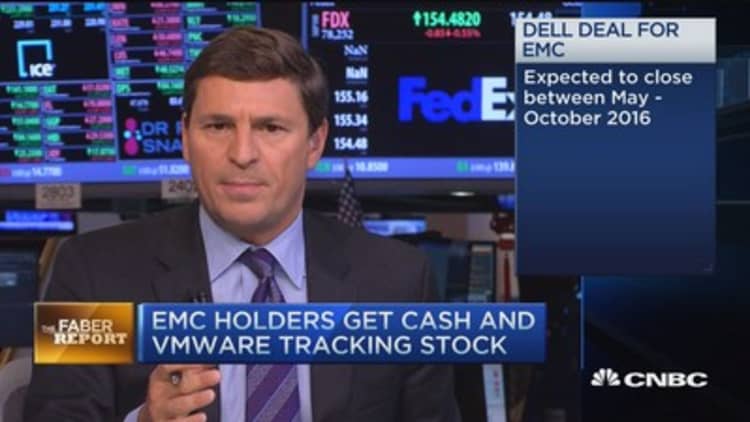
Though Dell has acquired companies like SecureWorks, SonicWALL and Boomi, Del Prete said this is the most "massive" attempt yet for Dell to retain its relevance. And the high-stakes play hinges on Dell's ability to retain EMC's sales force, Del Prete said.
"This deal succeeds or fails based on Dell's ability to leverage EMC's sales force, which is one of the strongest in the enterprise space," Del Prete said.
So far, Dell and EMC have not revealed if sales force cuts will be among the cost synergies, saying only that Dell salespeople were "excited" to bring more offerings to customers.
3. Staying nimble
Dell, with the addition of EMC, is undoubtedly massive. That leveraged consolidation is the opposite of strategies by technology companies such as eBay and Hewlett Packard, which are splitting apart to be more nimble and take on start-ups that have disrupted the industry, John Brod, co-founder of AOL Ventures and private messaging service Confide, told CNBC's "Squawk Alley."
Now Dell is tasked with proving their contrarian strategy to stay big will pay off, Brod said.
"One of the things I'm concerned about is from the structure standpoint," Brod said. "One of the knocks on EMC is their 'federation' approach. In the proposed structure, you still have VMware acting independently, you've got Pivotal acting as is, you've got EMC still in Massachusetts. So the question is, is this just additional federation under the Dell umbrella, or will they really be able to unify and take market share?"
While spinning off cloud services branch VMware would yield a high-growth businesses, Leiponen said that while Dell and EMC remain focused on commodity-like industries such as hardware and storage, there's no magic structure that will improve profit margins.
"They are trying to get into a competitive space," Leiponen said. "And it's not an industry that's going to turn into a gold mine."
4. Keeping up with changing demand
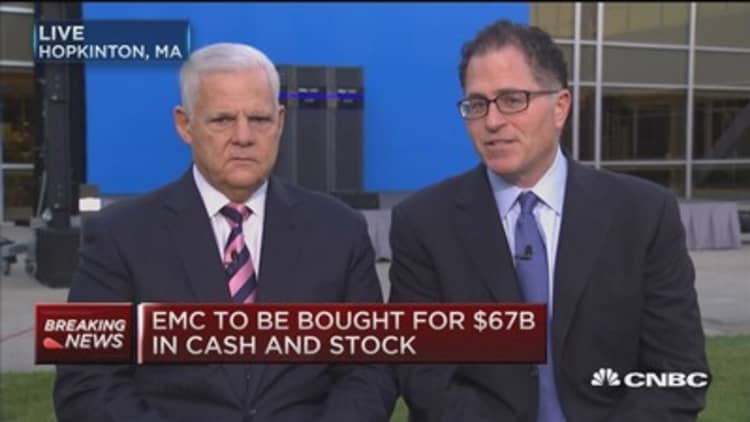
Brod also pointed to what he called the "consumeration of enterprise" that has allowed start-ups to market directly toward CIOs.
This merger could give Dell a "real good foothold" in that market, according to EMC CEO John Tucci.
"We have the assets between us now and the heft to make sure that we can help customers with digital transformation, help them with their cloud computing needs both on and off premise, help them with their infrastructure needs and really have broad solutions and have some great partners that are going to work with us to really give customers," Tucci told CNBC's "Squawk Box." "Because when you to talk to CIOs around the world, they really want less and stronger partners."
But Erik Gordon, a professor at the University of Michigan Ross School of Business, said his conversations with CIOs don't show the same demand.
"There was an an old phrase, 'Nobody got fired for specifying IBM,' " Gordon said. "Different companies used to use different operating systems. There wasn't a cloud, and it was really hard to make pieces work together. And IBM was turnkey."
That big, turnkey service is just not something he sees customers clamoring for today, as executives become more sophisticated in selecting IT products.
"Now we have some very different conditions," Gordon said. "A ton of highly trained IT people who know how to make systems work. Things are much more standardized. You don't even want to own your system, it's just in the cloud."
Gordon said Dell's acquisitions don't seem to follow the same long-term logic as competitors Amazon, Microsoft and Oracle, that are leaning more heavily on big data strategy and cloud security than network storage.
While Del Prete is more confident that Dell can "take another bit of the apple" with its enterprise ambitions, he also said there would be different trends at play for Dell long term.
"You can kind of see that there are all these changes coming, but at the end of the day you have to keep the lights on," Del Prete said. "This transition will take place over years, and Dell could use this to buff up their offerings and generate cash flow in the meantime."
— CNBC's Josh Lipton contributed to this report.



